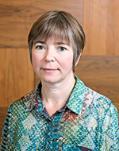In This Section
Dr Claire Murray
|
||
Professor Mary Donnelly Professor and Vice Dean of the School of Law at University College Cork (Primary Collaborator for the ELPIN project) Professor Mary Donnelly researches in the fields of mental capacity/mental health/health law. Her books include Healthcare Decision-Making and the Law: Autonomy, Capacity and the Limits of Liberalism (Cambridge: Cambridge University Press, 2010) and she is co-author of End-of-Life Care: Ethics and Law (Cork University Press, 2011) and co-editor of Ethical and Legal Debates in Irish Healthcare: Confronting Complexities (Manchester University Press, 2016). She was a member of the Expert Group to review the Mental Health Act 2001 (2013-2015) and is a member of the Mental Health Commission Legislation Committee. She was Chair of the Technical Expert Group to develop Codes of Practice under the Assisted Decision-Making (Capacity) Act 2015 and is the joint chair of the Health Service Executive National Consent Advisory Group/Assisted Decision Making Steering Group and the Chair the Ministerial Working Group on Advance Healthcare Directives. Professor Donnelly is the primary collaborator on the ELPIN project. |
||
UCC INTERNAL COLLABORATORSDr Joan McCarthy
Dr Joan McCarthy's research interests include feminist approaches to ethical decision-making and issues relating to reproductive rights. She has collaborated on a number of national and international research projects in healthcare ethics and was the principal investigator of a national multi-disciplinary project that developed an ethical and legal educational framework for end-of-life care in healthcare settings in Ireland (End-of-Life Care: Ethics and Law, Cork University Press, 2011). She addressed the Irish Citizens' Assembly on the Eighth Amendment of the Constitution and presented a highly influential paper on 'A Woman's Right to Choose: the moral arguments.' She is currently working on the development of a feminist approach to conscience in the delivery of reproductive healthcare, including abortion care. |
||
Professor Keelin O'Donoghue
|
||
Dr Nóirín Russell Consultant Obstetrician & Gynaecologist and Clinical Senior Lecturer at Cork University Maternity Hospital and University College Cork Dr Nóirín Russell is a member of the pregnancy loss research team. Her clinical interests include fetal and maternal medicine and intrapartum care. She is also the clinical lead for the colposcopy service at University Hospital Kerry. Her research interests include stillbirth prevention, prenatal diagnosis, and communication in healthcare and staff engagement. In August 2020, Nóirín was appointed Clinical Director of the Irish CervicalCheck Progamme. |
||
Dr Orla O'Donovan Senior Lecturer in the School of Applied Social Studies, University College Cork Dr Orla O'Donovan is the Principal Investigator for the Wellcome Trust funded project 'Living well with the dead in contemporary Ireland' which "aims to develop a medical humanities network equipped with a new and shared vocabulary that goes beyond existing intellectual frameworks to research changing Irish social imaginaries of living well with the dead." She is currently engaged in research in respect of the unborn dead. |
||
Fiona Kearney Founding Director of the Glucksman Gallery Fiona Kearney has curated exhibitions in Ireland and internationally, with particular emphasis on how contemporary art practice relates to research directions within academic contexts. Throughout her academic and professional career, Fiona has received several distinguished awards including the designation of college scholar by UCC, the NUI Prix d'Honneur from the French Government, a UCC President’s Award for Research on Innovative Forms of Teaching and the Jerome Hynes Fellowship on the Clore Leadership Programme. From 2009-2014, she served as a member of the Arts Council of Ireland and she is currently a board member of the Irish Architecture Foundation, VISUAL Carlow, and Cork Midsummer Festival. |
||
Dr Mary Tumelty
Dr Mary Tumelty's research interests include medical law, tort law, and alternative dispute resolution. She is particularly interested in legal and regulatory responses to medical error, and patient safety. |
|
|
EXTERNAL COLLABORATORS |
||
Dr Ruth Fletcher Senior Lecturer in Medical Law, Queen Mary University of London Dr Ruth Fletcher’s research is concerned with the practical everyday ways in which health, sexuality and reproduction become objects of legal struggle. Much of her work in this area has focused on documenting and critiquing the kinds of arguments and strategies that are generated in the regulation of abortion. She is also interested in reproduction as a key site of law and gender and is Co-investigator of the AHRC ReValuing Care network an international, interdisciplinary network which aims to create spaces for dialogue about care across a range of contexts. |
||
Dr Sheelagh McGuinness Reader in Law in the Centre for Health, Law, and Society in the University of Bristol School of Law Dr Sheelagh McGuinness is a member of the bpas Research and Ethics Committee. Sheelagh sits on the editorial board of Feminist Legal Studies and Medical Law International. She has published widely in the fields of health law, law and reproduction, and law and gender. She was involved in the ESRC funded 'Death before Birth' project. |
||
NETWORK MEMBERS |
||
Dr Orla McDonnellLecturer in Sociology at University of Limerick. Orla's research interests are in the areas of social theory and health, bioethics and the politics of healthcare, the sociology of mental health, and the interfaces between medical technologies, reproductive politics and society. Orla has wrtitten about the discourses and cultural dynamics surrounding reproductive politics in Ireland, including ‘The veto of moral politics. The catholic church and ARTs in Ireland’ (2017) in Assisted Reproduction Across Borders: Feminist Perspectives on Normalizations, Disruptions and Transmissions (edited by M. Lie and N. Lykke, Routledge), and ‘Mediating abortion politics in Ireland: media framing of the death of Savita Halappanavar’ (with Padraig Murphy, 2018), Critical Discourse Studies . She is currently researching medical representations of abortion in the shift from abortion as a moral to a healthcare issue. |
||
Sarah MeaneyResearcher at the National Perinatal Epidemiology Centre, CUMH / University College Cork. Sarah is a social researcher with a particular interest in the patient perspective of health care. She completed her PhD, entitled "Causes and consequences of pregnancy loss and perinatal death", in 2016. Sarah worked in the National Perinatal Epidemiology Centre (NPEC), in University College Cork. the mission of the NPEC is to translate data and evidence into improved maternity care for families in Ireland. Within this role Sarah sits on a number of national steering groups. Sarah has vast experience in both qualitative and quantitative health research and is currently working on a number of such projects in the NPEC including qualitative and quantitative projects investigating pregnancy, birth and pregnancy loss; "Planned Homebirths" (an audit of all homebirths in the Republic of Ireland); "The National Audit on Therapeutic Hypothermia in the Republic of Ireland"; and the management of the NPEC online database for three of the national audits. Sarah is also an associate editor for BMC Pregnancy and Childbirth. Sarah left the network in December 2020. |
||
Dr Katherine FurmanLecturer in Philosophy, Politics and Economics, University of Liverpool |
||
Dr Máiréad EnrightReader in Feminist Legal Studies, University of Birmingham Máiréad's current research is on the politics of reproductive justice, including historical institutional abuse of marginalised mothers. She is especially interested in how patriarchal legal and religious structures can be resisted and changed. Her research in this respect looks beyond traditional methods of law reform to consider illegality, protest, private litigation, and experimental legal drafting. She is Co-Director of the Northern/Irish Feminist Judgments Project and often consults with and advises groups and activists campaigning around reproductive rights and historical gender-based violence in Ireland. |
||
Dr Jenny DaggRe(al) Productive Justice Project, Centre for Disability Law and Policy, NUI Galway Jenny has a PhD in Sociology from the National University of Ireland, Galway. Her doctoral work explored the subject position of asylum seekers in Ireland as they seek recognition within the refugee process and received funding under PRTLI 4. Her research interests lie at the intersection of sociology and politics and continually explore the dynamics of power; agency and subjectivity; exclusion and marginalisation; along with qualitative research methods including biographical interviews, narratives, life histories, and visual methods. She is a postdoctoral researcher on the Re(al) Productive Justice project. |
||
Maria Ní FhlathartaRe(al) Productive Justice Project, Centre for Disability Law and Policy, NUI Galway Maria has a particular interest in legal capacity and reproductive decision making, as well as access to reproductive health care for marginalised groups. Maria has addressed a number of conferences on issues relating to reproductive rights and disability, both in Europe and internationally. Maria has a keen interest in reproductive justice and worked on the campaign platform for “Together For Yes”. She has also spoken on a number of TV and radio panels on issues of human rights and equality. In 2018 she was involved in the negation of the Nairobi Principles on prenatal testing. She holds an LLM in Comparative International Disability Law and Policy and is a graduate of the BCL in NUI Galway Law. Her other research interests include prisoner rights and access to justice. |
||
Dr Suzanne Doyle GuilloudSenior Research Associate in Healthcare Law at University of Bristol Law School Suzanne's research spans both reproductive justice and disability rights. She has particular interests in how normative constructions of legal capacity and decision-making operate in the context of pregnancy and childbirth and the role of law and ethics in imagining non-coercive frameworks of healthcare provision. |
||
Dr Heike FelzmannLecturer in Philosophy/Ethics, School of Humanities, NUI Galway. Heike is affiliated to the Centre of Bioethical Research and Analysis (COBRA) at NUIG. Her area of specialisation is Bioethics, with focus on research ethics, health care ethics and information ethics, especially robot ethics. She also works in moral theory, with focus on theory in/of Bioethics and feminist bioethics. |
||
Dr Andrea MulliganAssistant Professor at the School of Law, Trinity College Dublin Andrea's research centres around assisted reproduction, abortion, and pregnancy. She is especially interested in the intersections of private and public law in these areas, and in tortious mechanisms of vindicating fundamental rights. She has an ongoing interest in the area of reproductive ethics, encompassing work on abortion ethics and regulation and is currently working on conscientious objection rights in Irish abortion law. A practising barrister, Andrea works in complex healthcare litigation, and also directs the clinical legal education programme at Trinity College Dublin. |
||
Dr Claire PiersonLecturer in Gender Politics, University of Liverpool Claire's research focuses on reproductive rights and activism and more broadly on the UN women, peace and security agenda and conflict transformation. She is currently working on a project investigating healthcare perspectives on abortion law reform in Malta and developing ongoing policy work on a unique research project funded by a coalition of Irish trade unions addressing ‘Abortion as a workplace issue on the island of Ireland’ Claire is co-founder of the Reproductive Health Law and Policy Advisory Group |
||
Professor Elselijn KingmaProfessor of Philosophy and the Peter Sowerby Chair in Philosophy and Medicine, Kings College London. Before working at King's College, she worked at the University of Southampton as Associate Professor in Philosophy. From 2012 to 2019 she was Socrates Professor in the Philosophy of Ethics of Biotechnology at the University of Eindhoven. Elselijn's has research interests in philosophy of medicine, philosophy of biology, metaphysics and applied ethics. She has published on these topics in philosophy journals, medical journals, and the popular press, and offers research-based advice to policy makers, professional organisations and other groups involved in teh care of pregnant women. She is Principal Investigator on a five year, 1.2 million Euro ERC Starting Grant entitled 'Better Understanding the Metaphysics of Pregnancy'. Before studying Philosophy, Elselijn obtained undergraduate degrees in Clinical Medicine (2004) and Cognitive & Neuro Psychology (2004) at the University of Leiden, the Netherlands. |
||
Dr Jennifer DonnellyConsultant Obstetrician and Gynaecologist in the Rotunda and Mater Hospitals and an honorary clinical lecturer, RCSI Jennifer graduated from Trinity College, Dublin in 1997 and was awarded her MD in 2009 following her work on inherited thrombophilias in pregnancy. She undertook MFM Fellowships in Columbia University New York, & RCSI Dublin. Her research interests include medical disorders (particularly cardiology and venous thromboembolism) and disability in pregnancy, use of medication in pregnancy, prenatal screening, diagnosis and fetal intervention. She is co-founder of the Mater/Rotunda Maternal Medicine MDT and is dedicated to improving the quality and safety of obstetric care and the experience of pregnancy and birth. |
||
Dr Fionnuala GoughLecturer in Ethics, Medical School, Trinity College Dublin Fionnuala qualified as a medical doctor in 1989, training for a period of time in Obstetrics and Gynaecology. After completing a Masters in Medical Science (Pharmacology), she left clinical practice to undertake research and teach pharmacology in the RCSI. An interest in the interaction of law and medicine lead her to do an LLB and later a PhD in medical jurisprudence and bioethics. In recent years she has taught healthcare ethics and law to both undergraduate and postgraduate students in DCU, the RCPI, and the College of Anaesthetists. In October 2017 she joined the Medical School, TCD, as an ethics lecturer. |
||
Dr Trish HorganGeneral Practioner, Cork Trish is a General Practitioner with interest in women’s health, contraception and community provision of abortion care. She has been working as a family doctor in Blackpool, Cork City since 2002. She is also a member of START doctors group, an ICGP trainer in abortion care, an ICGP contraception and LARC tutor and a Member of Council of ICGP. |
||
Maeve TaylorDirector of Advocacy and Communications, Irish Family Planning Association Mary's role involves advocacy in relation to Irish law and policy and overseas development policy. She has a background in adult education, with a focus on gender, development and human rights. She holds a Bachelor of Civil Law degree from University College Dublin and a Master’s degree in human rights law from Queen’s University, Belfast. |
||
Mary BrosnanDirector of Midwifery and Nursing in the National Maternity Hospital Mary is a Florence Nightingale Foundation Leadership Scholar 2018-2019. She is a former Honorary President of the Irish Association of Directors of Nursing and Midwifery and an Adjunct Associate Professor of the School of Nursing, Midwifery and Health Systems in University College Dublin. In 2017 she was awarded Honorary Fellowship ad Eundem of the Faculty of Nursing and Midwifery in the Royal College of Surgeons, Ireland, for her contribution to midwifery |
||
Dr Richard DuffyConsultant in Perinatal Psychiatry, Rotunda Hospital / Consultant in Liaison Psychiatry, Mater Hospital Richard has lectured in psychiatry in University College Dublin. He holds a MSc in epidemiology from the London School of Hygiene and Tropical Medicine. He is currently undertaking a PhD in in Trinity College Dublin evaluating the impact of human rights standards on India’s mental health law. His other areas of interest include asylum seekers and refugees. |
||
Dr Louise CampbellLecturer in Medical Ethics, School of Medicine, NUI Galway Louise has a Ph.D in philosophy from the University of Essex and a post-doctoral qualification in clinical and organisational ethics from the Joint Centre for Bioethics, University of Toronto. Her research interests include psychiatric ethics, clinical ethics consultation and end-of-life care.
|
||
Rióna CotterProgramme Manager for National Standards for Bereavement Care following pregnancy loss & perinatal death Rióna is a registered nurse and midwife and has worked in the Irish health services for the last twenty five years and in maternity services since 1999. Rióna has worked in different roles within the maternity services, including frontline clinical care, Quality & Patient Safety and Midwifery Management. In March 2017, she took up the role of HSE National Programme Manager for the Implementation of the National Standards for Bereavement Care Following Pregnancy Loss and Perinatal Death within the National Women and Infants’ Health Programme. Rióna has worked in collaboration with the multidisciplinary teams in all 19 Maternity hospitals in the ROI to implement the Standards in each hospital. As part of the implementation Rióna has also worked in co-operation with the various support groups and parents groups who provide support to bereaved parents. |
||
Karyn WalshClinical Midwife Manager, Early Pregnancy Services, CUMH Karyn has developed a pathway for the Termination of Pregnancy Services at the Cork University Maternity Hospital. She coordinates those services liaising with Consultant Obstetricians, General Practitioners and the inpatient gynaecology ward. She is currently undertaking a Professional Certificate in Early Pregnancy Ultrasound in University College Dublin. |
||
Dr Cliona MurphyObstetrician and Gynaecologist, and Chair of the Institute of Obstetricians and Gynaecologists in Dublin |
||
Dr Margaret MurphyMargaret Murphy is a Lecturer in Midwifery at the School of Nursing and Midwifery, University College Cork. Her doctoral thesis explored the experiences of couples in pregnancy following stillbirth and miscarriage using Interpretative Phenomenological Analysis. She was elected to the Executive Board of the International Stillbirth Alliance in September 2016 and elected Treasurer in September 2017. She also sits on the Scientific Advisory Committee of the International Stillbirth Alliance and as a Member of the Lancet Stillbirths in High-Income Countries Investigator Group and contributed Irish stillbirth data to The Lancet Ending Preventable Stillbirth Series 2016. She is a member of the Pregnancy Loss Research Group, INFANT Research Centre, Cork University Maternity Hospital. She is experienced in qualitative and qualitative research methodologies particularly Interpretive Phenomenological Analysis. She is a Registered Midwife, Registered General Nurse, and an International Board Certified Lactation Consultant. |
||
PROJECT SUPPORT |
||
Katherine Thackeray
Katherine is the ELPIN Project Administrator. Katherine is an experienced NHS service planning manager and clinical network manager, and holds a Masters in Government and Public Policy from UCC, studying the differences in the structure and management of out-of-hours healthcare provision in the UK and Ireland. Katherine most recently project managed a 5-year dementia research and education project in the Department of General Practice, UCC. |
||
Ethics, Law and Pregnancy in Ireland Network
Contact us





